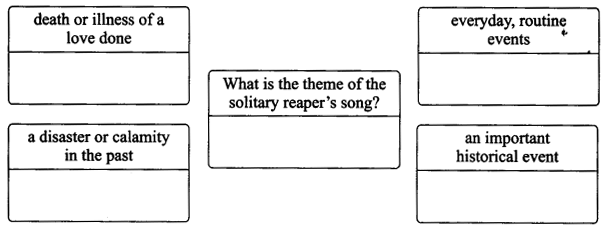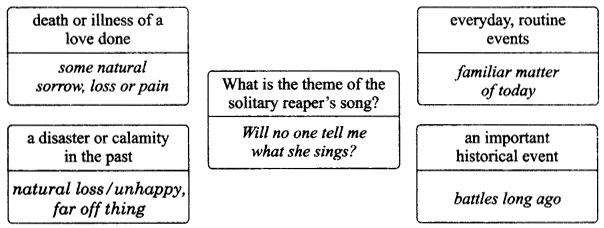Question 1.
Sometimes we see something beautiful and striking, and we remember it for a long time afterwards. Can you recollect this ever happening to you? If so, what was it? What do you remember about it now? Are the details of what you saw or the feelings you experienced at that time fresh in your mind? Think for a few minutes, then share your thoughts with the class.
Answer:
A Classroom Activity.
Question 2.
Listen to one of William Wordsworth’s poems that describes a memorable experience he had while out on a walk. (Your teacher will play a recording.) Listen to the poem at least twice.
Answer:
Do it yourself.
Question 3.
See textbook on page 69.
Answer:
Do it yourself.
Question 4.
Imagine that you are the poet, William Wordsworth. You continue on your walk, and when you reach home you tell a friend what you saw and felt. Which of the following best describes your experience? (Work in pairs, then have a class discussion.)
(a) “I was walking past some fields when I saw a young girl, a farm worker, harvesting grain by hand, with a sickle. She was so beautiful that I stood out of sight and watched her for a long time. I have never seen anyone more gorgeous! In fact, she reminded me of other beautiful experiences I’ve had—the song of the nightingale or the cuckoo, for instance. I’d certainly like to see her again!”
(b) “As I was standing on the hill top just now, I heard a very sad and plaintive song. I looked down, and saw a young woman reaping grain, singing as she did so. She seemed very melancholy as she sang. But somehow her song brought great comfort and joy to me. In fact, I found it a very emotional experience. As I continued my walk along the hill top, I also heard a nightingale and a cuckoo. But the young farm worker’s song affected me most deeply, even though I couldn’t understand the words.”
(c) “Just now, as I was walking in the valley, I saw a young farm worker in die field. She was singing to herself as she worked. I was so affected by her singing that I stopped and listened. She had a beautiful voice, which seemed to fill the whole valley. The song was a sad one, and I couldn’t understand the words. But its plaintive tone and melancholy sound tquched me greatiy, and, its beauty reminded me of the song of a nightingale or a cuckoo. After some time I walked up the hill, carrying the memory of the young woman’s song with me.”
Question 5.
The poet could not understand the words of the song, yet he raised several possibilities about its theme. In the diagram below are some of these possibilities. Read the third stanza again, and find the phrase that matches each. Copy and complete the diagram, writing each phrase in die empty boxes. Work in pairs:
Answer:
The best answer is ‘(c)’.
[A Classroom Activity]

Answer:

Question 6.
On the basis of your understanding of the poem, answer the following questions by ticking the correct choice:
(a) The central idea of the poem ‘ The Solitary Reaper’ is
- (i) well sung songs give us happiness
- (ii) melodious sounds appeal to all
- (iii) beautiful experiences give us lifelong pleasure
- (iv) reapers can sing like birds
Answer:
(iii) beautiful experiences give us lifelong pleasure
(b) In the poem ‘ The Solitary Reaper ’ to whom does the poet say “Stop here or gently pass’?
- (i) to the people cutting com
- (ii) to himself
- (iii) to the people who make noise
- (iv) to all the passers-by
Answer:
(iv) to all the passers-by
(c) ’The Solitary Reaper’ is a narrative poem set to music. This form of verse is called a ……..
- (i) ballad
- (ii) soliloquy
- (iii) monologue
- (iv) sonnet
Answer:
(i) ballad
(d) The poet’s lament in the poem ‘ The Solitary Reaper’ is that
- (i) he cannot understand the song
- (ii) he did not know the lass
- (iii) she stopped singing at once
- (iv) he had to move away
Answer:
(i) he cannot understand the song
(e) The setting of the poem is
- (i) Arabia
- (ii) Hebrides
- (iii) Scotland
- (iv) England
Answer:
(iii) Scotland
Question 7.
(a) Read the second stanza again, in which Wordsworth compares the solitary reaper’s song with the song of the nightingale and the cuckoo. On the basis of your reading (and your imagination), copy and complete the table below. (Work in groups of four, then have a brief class discussion.)
| |
Place |
Heard by |
Impact on listener |
| Solitary Reaper |
Scottish Highlands |
the poet |
holds him spellbound |
| Nightingale |
|
|
|
| Cuckoo |
|
|
|
(b) Why do you think Wordsworth has chosen the song of the nightingale and the cuckoo for comparison with the solitary reaper’s song?
(c) As you read the second stanza, what pictures come to your mind? Be ready to describe them in your own words, to the rest of the class. (Do not be afraid to go beyond what the poet has written.)
Answer:
(a)
| |
Place |
Heard by |
Impact on listener |
| Solitary Reaper |
Scottish Highlands |
the poet |
holds him spellbound |
| Nightingale |
Arabian Sands |
weary travellers |
feel refreshed |
| Cuckoo |
Hebrides |
islanders |
thrilled |
(b) The nightingale and the cuckoo are the two birds which are famous for their sweet and melodious songs. So, it is quite natural that Wordsworth compares the sweet song of the solitary reaper to these birds.
(c)
- The first picture that comes to my mind is the desert of Arabia. The scorching sun is burning everything. Poor travellers are tired and thirsty. They are making their camels run for some shady haunts. At last, they find a shady place with water. They lie down to have some rest. Suddenly, a melodious voice captures their hearts. The nightingale’s song refreshes the tired travellers. They are up again for their onward journey.
- The Hebrides are wrapped in silence. A ship anchors there. A sweet voice breaks the silence of the seas. It is the melodious voice of the cuckoo. The song thrills all the seamen. The whole mountain region resounds with the song.
Question 8.
In the sixth line of the first stanza, we read:
“… and sings a melancholy strain…. ”
This “s” sound at the beginning of sings and strain has been repeated. Poets often do this.
Do you know why? Do you know what this “poetic repetition” is called? Can you find other instances of this, in The Solitary Reaper?
Answer:
In ‘sings’ and ‘strain’, “s” sound has been repeated. The use of the same letter or sound at the beginning of words that are close together is quite common in poetry. This “poetic repetition is called “alliteration”. It is used to heighten the musical and lyrical impact of the poem.
Repetition of “s” sound in ‘silence of the seas’.
Repetition of “a” sound in ‘Among Arabian Sands’.
Repetition of “1” sound in ‘Listened, motionless and still’.
Question 9.
In the first stanza, some words or phrases have been used to show that the girl working in the fields is alone. Which are those words and phrases? What effect do they create in the mind of the reader?
Answer:
The poet uses some words or phrases in the first stanza to show that the girl working in the field is alone. These words are:
“Single” in the field
“solitary” Highland lass
singing “by herself’
“Alone” she cuts
These words and phrases focus our attention solely on the reaper. We keep our eyes only on her and our ears to her melodious song. These words create a sense of‘mystery’ and the presence of a lonely girl among those natural surroundings does create a romantic setting.
Question 10.
Wordsworth was so moved by this experience that later he wrote this poem. Think back in your own life and try to recall an experience that affected you greatly and left a deep impact on you. Then write a poem for your school magazine in which you describe that experience and its impact.
Answer:
For. self-attempt.